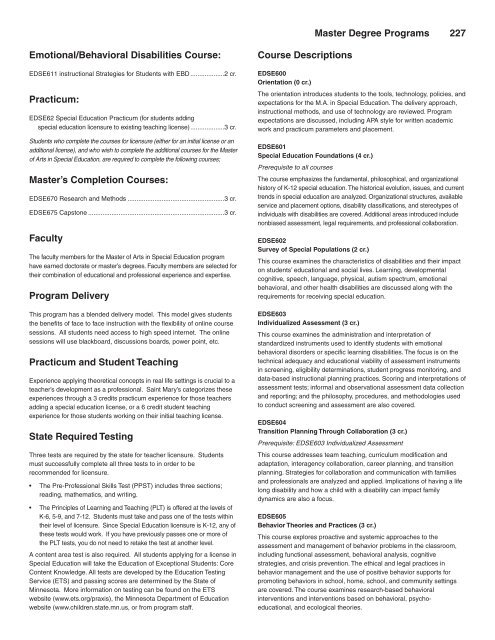& Student Handbook - Saint Mary's University of Minnesota
& Student Handbook - Saint Mary's University of Minnesota
& Student Handbook - Saint Mary's University of Minnesota
You also want an ePaper? Increase the reach of your titles
YUMPU automatically turns print PDFs into web optimized ePapers that Google loves.
Master Degree Programs 227<br />
Emotional/Behavioral Disabilities Course:<br />
EDSE611 instructional Strategies for <strong>Student</strong>s with EBD...................2 cr.<br />
Practicum:<br />
EDSE62 Special Education Practicum (for students adding<br />
special education licensure to existing teaching license)...................3 cr.<br />
<strong>Student</strong>s who complete the courses for licensure (either for an initial license or an<br />
additional license), and who wish to complete the additional courses for the Master<br />
<strong>of</strong> Arts in Special Education, are required to complete the following courses;<br />
Master’s Completion Courses:<br />
EDSE670 Research and Methods ......................................................3 cr.<br />
EDSE675 Capstone ............................................................................3 cr.<br />
Faculty<br />
The faculty members for the Master <strong>of</strong> Arts in Special Education program<br />
have earned doctorate or master’s degrees. Faculty members are selected for<br />
their combination <strong>of</strong> educational and pr<strong>of</strong>essional experience and expertise.<br />
Program Delivery<br />
This program has a blended delivery model. This model gives students<br />
the benefits <strong>of</strong> face to face instruction with the flexibility <strong>of</strong> online course<br />
sessions. All students need access to high speed internet. The online<br />
sessions will use blackboard, discussions boards, power point, etc.<br />
Practicum and <strong>Student</strong> Teaching<br />
Experience applying theoretical concepts in real life settings is crucial to a<br />
teacher’s development as a pr<strong>of</strong>essional. <strong>Saint</strong> Mary’s categorizes these<br />
experiences through a 3 credits practicum experience for those teachers<br />
adding a special education license, or a 6 credit student teaching<br />
experience for those students working on their initial teaching license.<br />
State Required Testing<br />
Three tests are required by the state for teacher licensure. <strong>Student</strong>s<br />
must successfully complete all three tests to in order to be<br />
recommended for licensure.<br />
• The Pre-Pr<strong>of</strong>essional Skills Test (PPST) includes three sections;<br />
reading, mathematics, and writing.<br />
• The Principles <strong>of</strong> Learning and Teaching (PLT) is <strong>of</strong>fered at the levels <strong>of</strong><br />
K-6, 5-9, and 7-12. <strong>Student</strong>s must take and pass one <strong>of</strong> the tests within<br />
their level <strong>of</strong> licensure. Since Special Education licensure is K-12, any <strong>of</strong><br />
these tests would work. If you have previously passes one or more <strong>of</strong><br />
the PLT tests, you do not need to retake the test at another level.<br />
A content area test is also required. All students applying for a license in<br />
Special Education will take the Education <strong>of</strong> Exceptional <strong>Student</strong>s: Core<br />
Content Knowledge. All tests are developed by the Education Testing<br />
Service (ETS) and passing scores are determined by the State <strong>of</strong><br />
<strong>Minnesota</strong>. More information on testing can be found on the ETS<br />
website (www.ets.org/praxis), the <strong>Minnesota</strong> Department <strong>of</strong> Education<br />
website (www.children.state.mn.us, or from program staff.<br />
Course Descriptions<br />
EDSE600<br />
Orientation (0 cr.)<br />
The orientation introduces students to the tools, technology, policies, and<br />
expectations for the M.A. in Special Education. The delivery approach,<br />
instructional methods, and use <strong>of</strong> technology are reviewed. Program<br />
expectations are discussed, including APA style for written academic<br />
work and practicum parameters and placement.<br />
EDSE601<br />
Special Education Foundations (4 cr.)<br />
Prerequisite to all courses<br />
The course emphasizes the fundamental, philosophical, and organizational<br />
history <strong>of</strong> K-12 special education. The historical evolution, issues, and current<br />
trends in special education are analyzed. Organizational structures, available<br />
service and placement options, disability classifications, and stereotypes <strong>of</strong><br />
individuals with disabilities are covered. Additional areas introduced include<br />
nonbiased assessment, legal requirements, and pr<strong>of</strong>essional collaboration.<br />
EDSE602<br />
Survey <strong>of</strong> Special Populations (2 cr.)<br />
This course examines the characteristics <strong>of</strong> disabilities and their impact<br />
on students’ educational and social lives. Learning, developmental<br />
cognitive, speech, language, physical, autism spectrum, emotional<br />
behavioral, and other health disabilities are discussed along with the<br />
requirements for receiving special education.<br />
EDSE603<br />
Individualized Assessment (3 cr.)<br />
This course examines the administration and interpretation <strong>of</strong><br />
standardized instruments used to identify students with emotional<br />
behavioral disorders or specific learning disabilities. The focus is on the<br />
technical adequacy and educational viability <strong>of</strong> assessment instruments<br />
in screening, eligibility determinations, student progress monitoring, and<br />
data-based instructional planning practices. Scoring and interpretations <strong>of</strong><br />
assessment tests; informal and observational assessment data collection<br />
and reporting; and the philosophy, procedures, and methodologies used<br />
to conduct screening and assessment are also covered.<br />
EDSE604<br />
Transition Planning Through Collaboration (3 cr.)<br />
Prerequisite: EDSE603 Individualized Assessment<br />
This course addresses team teaching, curriculum modification and<br />
adaptation, interagency collaboration, career planning, and transition<br />
planning. Strategies for collaboration and communication with families<br />
and pr<strong>of</strong>essionals are analyzed and applied. Implications <strong>of</strong> having a life<br />
long disability and how a child with a disability can impact family<br />
dynamics are also a focus.<br />
EDSE605<br />
Behavior Theories and Practices (3 cr.)<br />
This course explores proactive and systemic approaches to the<br />
assessment and management <strong>of</strong> behavior problems in the classroom,<br />
including functional assessment, behavioral analysis, cognitive<br />
strategies, and crisis prevention. The ethical and legal practices in<br />
behavior management and the use <strong>of</strong> positive behavior supports for<br />
promoting behaviors in school, home, school, and community settings<br />
are covered. The course examines research-based behavioral<br />
interventions and interventions based on behavioral, psychoeducational,<br />
and ecological theories.
















